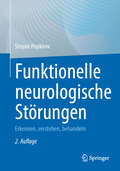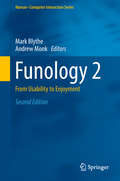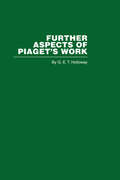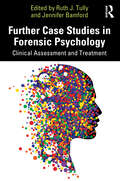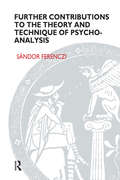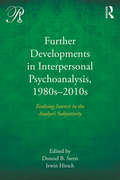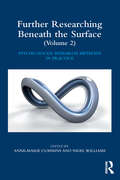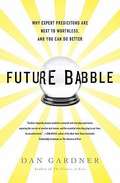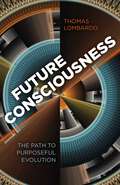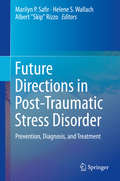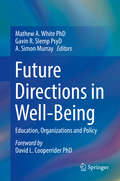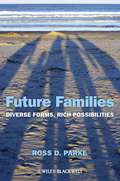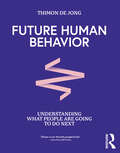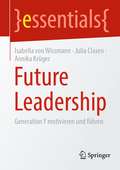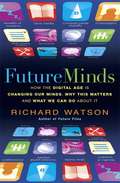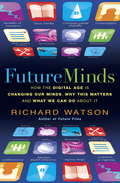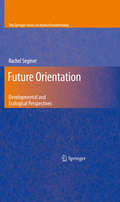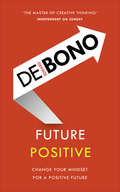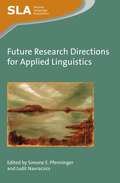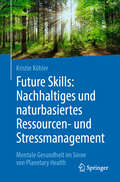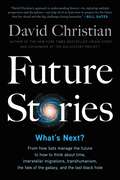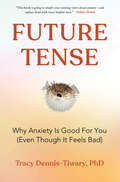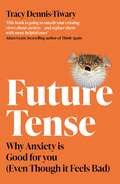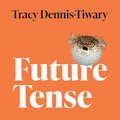- Table View
- List View
Funktionelle neurologische Störungen: Erkennen, verstehen, behandeln
by Stoyan PopkirovDas Gebiet der funktionellen Störungen hat in der Neurologie inzwischen einen festen Platz eingenommen. Um Behandelnden Sicherheit bei der Diagnostik und handfeste Unterstützung bei der Therapie zu bieten, erläutert dieses Buch praxisnah und evidenzbasiert Untersuchungstechniken und klinische Zeichen, die eine frühe und sichere Diagnosestellung jenseits des Ausschlussprinzips möglich machen. Der Autor erklärt die Wirkungsweise verschiedener Therapien und gibt Tipps zur ärztlichen Gesprächsführung sowie konkrete Behandlungsempfehlungen aus der Physiotherapie und Psychotherapie, um die interdisziplinäre Patientenversorgung zu erleichtern. Die überarbeitete Auflage berücksichtigt aktuelle Entwicklungen aus der klinischen Forschung mit einem Akzent auf praktisch relevanten Aspekten. Neue Kapitel behandeln das pragmatische Management funktioneller neurologischer Störungen in der Notaufnahme und Besonderheiten bei Kindern und Jugendlichen.
Funny Peculiar: Gershon Legman and the Psychopathology of Humor
by Mikita BrottmanWhy are jokes funny? Why do we laugh? In Funny Peculiar, Mikita Brottman demurs from recent scholarship that takes laughter-- and the broader domain of humor and the comical--as a liberating social force and an endearing aspect of self-expression. For Brottman, there is nothing funny about laughter, which is less connected to mirth and feelings of good will than to a nexus of darker emotions: fear, aggression, shame, anxiety. Brottman rethinks not only the mechanisms of humor but also the relation of humor to the body and the senses. To this end, she provides an engrossing account of the life and work of Gershon Legman, exiled author, publisher, and sexologist, Alfred Kinsey's first bibliographer, and legendary compiler of the dirty joke. Like Freud, Legman was convinced of the impossibility of understanding humor apart from sex, and Brottman shows how his two massive works on the subject, Rationale of the Dirty Joke and No Laughing Matter, provide a framework for understanding the ambivalent and often hostile impulses that underlie the comic impulse in its various guises. In lively and enlivening chapters, she traverses dirty jokes, the figure of the "evil clown" in popular culture, the current popularity of "humor therapy," changing fashions in stand-up comedy, and the connection between humor and horror. Brottman's sparkling prose, laced with wit, does not obscure the seriousness of Funny Peculiar. It is a thoughtful and wide-ranging elaboration of the Freudian claim that joking, in point of fact, is no laughing matter.
Funology 2: From Usability to Enjoyment (Human–Computer Interaction Series)
by Mark Blythe Andrew MonkHow should we understand and design for fun as a User Experience? This new edition of a classic book is for students, designers and researchers who want to deepen their understanding of fun in the context of HCI. The 2003 edition was the first book to do this and has been influential in broadening the field. It is the most downloaded book in the Springer HCI Series. This edition adds 14 new chapters that go well beyond the topics considered in 2003. New chapter topics include: online dating, interactive rides, wellbeing, somaesthetics, design fiction, critical design and participatory design methods. The first edition chapters are also reprinted, with new notes by their authors setting the context in which the 2003 chapter was written and explaining the developments since then. Taken with the new chapters this adds up to a total of 35 theoretical and practical chapters written by the most influential thinkers from academia and industry in this field.
Further Case Studies in Forensic Psychology: Clinical Assessment and Treatment
by Jennifer Bamford Ruth J. TullyThis unique book offers valuable insights into the often-hidden world of forensic psychological assessment and intervention. It follows on from Case Studies in Forensic Psychology (2019) and presents a range of detailed clinical case studies of adults and young people across secure and community settings. The case studies represent individuals with several different forms of offending histories, such as sexual and violent offending, and various clinical diagnoses including autism and acquired brain injury. Each chapter details the individual’s personal background, offending, any relevant psychiatric or psychological diagnoses, and treatments. The chapters end with an intensive discussion on the outcomes for that case, and its wider implications. This book allows the readers to understand the on-ground clinical practice and day-to-day role of a forensic psychologist by demonstrating the work undertaken behind the empirical research and highlighting the complexities to which psychologists need to apply their expertise. It also brings together treatment models and forensic research to establish how theory translates into practice and consider whether it is effective at an individual level. Further Case Studies in Forensic Psychology is key reading for psychologists, clinicians and practitioners at any stage of their career in this rapidly expanding field. It will also be useful for students of forensic psychology and those interested in the real-life work of psychologists in forensic practice.
Further Contributions to the Theory and Technique of Psycho-analysis (Brunner-mazel Classics In Psychoanalysis Ser. #No. 7)
by Sandor FerencziCharts the development of Ferenczi's 'Active Technique' in papers such as "The Technique of Psychoanalysis" and "Further Development of an Active Therapy". Ferenczi made outstanding contributions to the theory and practice of psychoanalysis. This volume, first published in 1926, brings together the fruit of ten year's work and study. Primary medical in orientation and concerned with technique, it covers a wide range of topics: Nosology, Technique, Sexual Theory, From the Nursery, Dreams, Symbolism, Applied Psycho-Analysis, Medical Jurisprudence and Religion.
Further Developments in Interpersonal Psychoanalysis, 1980s-2010s: Evolving Interest in the Analyst’s Subjectivity (Psychoanalysis in a New Key Book Series)
by Donnel B. Stern Irwin HirschFurther Developments in Interpersonal Psychoanalysis, 1980s-2010s is the second collection of selected classic articles of the modern era by psychoanalysts identified with the interpersonal perspective. The first, The Interpersonal Perspective in Psychoanalysis, 1960s-1990s presented articles by second and third generation interpersonalists. This book contains those written by the third and fourth generation of interpersonal psychoanalysts. The articles selected by the Editors for this second book extend the theme of transference and countertransference that was the throughline of the first book, lending even greater significance in clinical practice to the analyst’s subjectivity and its relation to the patient’s mind. One chapter after another in this book reveal ways that the analyst’s experience can lead to a greater appreciation of the patient’s unconscious experience. It is because of papers such as these that interpersonal psychoanalysis has been described as the origin, at least in North America, of the contemporary clinical interest in psychoanalytic subjectivity. As in the first, the articles in this second book include classic contributions from Bromberg, Greenberg, Hirsch, Mitchell, Levenson, Stern, and Wolstein; these writers are joined here by Blechner, Bonovitz, Buechler, Fiscalini, Held-Weiss, Kuriloff, and White. North American psychoanalysis has long been deeply influenced and substantially changed by clinical and theoretical perspectives first introduced by interpersonal psychoanalysis. Yet even today, despite its origin in the 1930s, many otherwise well-read psychoanalysts and psychotherapists are not well informed about the field. Along with its companion work, this book provides a superb starting point for those who are not as familiar with interpersonal psychoanalysis as they might be. For those who already know the literature, the book will be useful in placing a selection of classic interpersonal articles and their writers in key historical context.
Further Researching Beneath the Surface: Psycho-Social Research Methods in Practice - Volume 2
by Nigel Williams Anne-Marie CumminsContributions in this volume cover ways of knowing, the dynamics of research encounters, new methods of psycho-social inquiry, and the first-hand experience of being a researcher. Since the first volume of Researching Beneath the Surface was published by Karnac in 2009, psycho-social research has become more established but is also more scrutinised by a new generation of researchers, practitioners, and clinicians. This volume offers a timely exploration of the latest developments in psycho-social research, bringing together a series of papers in which both longstanding contributors to the field and new researchers explore tensions, possibilities, and innovations in psycho-socially inspired research.Showcasing advances in psycho-social research methods, the book focuses on methodological dilemmas, innovations in method and methodology, and on experiences of conducting psycho-social research in challenging contexts. It also focusses on the contested but pivotal role of psychoanalysis in psycho-social research and explores what can be added by transdisciplinary use of deep ecology, continental philosophy, and relational approaches as alternative or supplementary ways of knowing.Further Researching Beneath the Surface: Psycho-social Research Methods in Practice offers fresh insight into the practical and emotional issues of conducting oneself as a psycho-social researcher and learning from experience. It will be of great interest to psycho-social, qualitative, organisational, and psychoanalytically-oriented researchers, as well as postgraduate students in these fields.
Future Babble
by Dan GardnerIn 2008, as the price of oil surged above $140 a barrel, experts said it would soon hit $200; a few months later it plunged to $30. In 1967, they said the USSR would be the world’s fastest-growing economy by 2000, the USSR no longer existed. In 1908, it was pronounced that there would be no more wars in Europe; we all know how that turned out. Face it, experts are about as accurate as dart-throwing monkeys. And yet every day we ask them to predict the future—everything from the weather to the likelihood of a terrorist attack. Future Babble is the first book to examine this phenomenon, showing why our brains yearn for certainty about the future, why we are attracted to those who predict it confidently, and why it’s so easy for us to ignore the trail of outrageously wrong forecasts. In this fast-paced, example-packed, sometimes darkly hilarious book, Dan Gardner shows how seminal research by professor Philip Tetlock proved that the more famous a pundit is, the more likely they are to be right about as often as a stopped watch. Gardner also draws on current research in cognitive psychology, political science, and behavioral economics to discover something quite reassuring: The future is always uncertain, but the end is not always near.
Future Consciousness: The Path to Purposeful Evolution
by Thomas LombardoHow do our unique conscious minds reflect and amplify nature&’s vast evolutionary process? This book provides a scientifically informed, psychologically holistic approach to understanding and enhancing our future consciousness, serving as a guide for creating a realistic, constructive, and ethical future. Thomas Lombardo reveals how we can flourish in the flow of evolution and create a prosperous future for ourselves, human society and the planet.
Future Directions in Post-Traumatic Stress Disorder
by Marilyn P. Safir Helene S. Wallach Albert Skip" RizzoOurs is an era of increasing tension, both global and local. And not surprisingly, PTSD is recognized not only in combat veterans and active military personnel, but also disaster and assault survivors across the demographic spectrum. As current events from mass shootings to the debate over trigger warnings keep the issue in the public eye, the disorder remains a steady concern among researchers and practitioners. Future Directions in Post-Traumatic Stress Disorder presents findings and ideas with the potential to influence both our conceptualization of the condition and the techniques used to address it. A multidisciplinary panel of experts offers new analyses of risk and resilience factors, individual and group approaches to prevention, the evolving process of diagnosis, and effective treatment and delivery. Chapters on treatment allow readers to compare widely-used prolonged exposure and VR methods with innovative applications of cognitive processing therapy and interpersonal therapy. And an especially compelling contribution surveys empirically-based programs relating to what for many is the emblematic trauma of our time, the events of September 11, 2001. Included in the coverage: Predictors of vulnerability to PTSD: neurobiological and genetic risk factors. Early intervention: is prevention better than cure? The functional neuroanatomy of PTSD. The development of evidence-based treatment for PTSD. Enhancing exposure therapy using D-Cycloserine (DCS). PLUS: a case example as seen through five therapeutic perspectives. While millions experience trauma, relatively few develop chronic PTSD. Future Directions in Post-Traumatic Stress Disorder is a practical and proactive reference for the health and clinical psychologists, sociologists, psychiatrists, and primary care physicians dedicated to further decreasing those numbers.
Future Directions in Well-Being
by A. Simon Murray Mathew A White Gavin R. SlempThis book is a collection of essays advancing the discourse in well-being science, authored by key thought leaders in positive psychology and its variants, including positive education, character education, and positive organizational scholarship. The authors address topics such as the next big ideas in well-being research and practice, potential strategies , as well as current gaps and limitations of the field. This book will be of particular interest for policy makers, educators and practitioners, as well as researchers.
Future Families: Diverse Forms, Rich Possibilities
by Ross D. ParkeFuture Families explores the variety of family forms which characterize our contemporary culture, while addressing the implications of these increasingly diverse family units on child development. Reveals the diversity of new family forms based on the most current research on fathers, same-gender parents, new reproductive technologies, and immigrant families Illustrates that children and adults can thrive in a variety of non-traditional family forms Shows the interrelatedness of new trends in family organization through the common themes of embedded families and caregiving in community and cultural contexts Features an interdisciplinary approach, drawing from works in areas that include child development, family studies, sociology, cross-cultural scholarship, ethnic studies, biology, neuroscience, anthropology and even architecture Sets an agenda for future research in the area of families by identifying important gaps in our knowledge about families and parenting
Future Human Behavior: Understanding What People Are Going To Do Next
by Thimon De JongThe world continues to develop at an astonishing speed – socially and technologically. Human behavior is continually influenced by this ever-changing environment. Is it possible to predict what those new behaviors will be? And what are their implications for our future societies? Thimon de Jong’s Future Human Behavior is a unique and accessible examination of our thrilling, challenging and unpredictable world and how we respond, react and shape it. Using insightful and original examples aligned with pertinent analysis, the author takes the reader on a compelling journey through future behavioral dynamics. He engages with a wide variety of topics, from digitalisation to trust, from ethics to mental health. Future Human Behavior is your inspirational guide to a number of possible futures, and the book you need to be ready for them all.
Future Leadership: Generation Y motivieren und führen (essentials)
by Julia Clasen Isabella von Wissmann Annika KrügerWie wollen Mitglieder der Generation Y geführt werden? Auf Basis wissenschaftlicher Erkenntnisse liefert dieses essential Führungskräften, Beratern und Coaches praktische Handlungsempfehlungen und effektive Methoden für die erfolgreiche Führung von Nachwuchskräften. Anhand von aktuellen Studien werden Bedürfnisse und Erwartungen der Ypsiloner an Führung identifiziert und Erfolgsfaktoren zur Führung dieser Generation abgeleitet. Im Überblick werden drei zentrale Methoden agiler Führung vorgestellt: Scrum, Design Thinking und OKR. Resümierend können Ansätze des agilen Managements zur effektiven Führung von Mitarbeitern der Generation Y als erfolgversprechend bewertet werden.
Future Minds: How the Digital Age Is Changing Our Minds, Why This Matters, and What We Can Do About It
by Richard WatsonWe are on the cusp of a revolution. Mobile phones, computers and iPods are commonplace in hundreds of millions of households worldwide, influencing how we think and shaping how we interact. In the future, smart machines will compete with clever people for employment and even human affection. We are shifting to a world where knowledge will be automated and people will be rewarded instead as conceptual and creative thinkers. Hence being able to think and act in ways that machines cannot will become vital. Ideas are the currency of this new economy and curiosity and imagination are among the key raw materials. But what happens to the rigour of our thinking in a world where we never really sit still or completely switch off? What are some of the unexpected consequences of digital information on the 100 billion cells and quadrillion connections inside our brains? Future Minds illustrates how to maximise the potential of digital technology and minimise its greatest downside, addressing the future of thinking and how we can ensure that we unleash the extraordinary potential of the human mind. In this absorbing new book, discover all about: the sex life of ideas; the rise of the screenager; generations, gender and geography; delving deep inside your head; how to clear a blocked brain; why clever people make dumb mistakes; why we are so afraid of doing nothing; what we can do to reclaim our brains.
Future Minds: How the Digital Age Is Changing Our Minds, Why This Matters, and What We Can Do About It
by Richard WatsonDrawing on the latest research, this book looks at the ways that screen culture is shaping the future and changing the way we think. Future Minds asks: are we becoming addicted to data and how do we go about starting a digital diet, urgently? You'll find thought-provoking and practical suggestions about reclaiming the space and time to think deeply.
Future Orientation
by Rachel SeginerWhere am I going? What do I want to do with my life? Such questions are typical of--even essential to--adolescence and continue to influence individuals throughout their lifetimes. And although human beings are capable of anticipating future events even as infants, the teen years are the peak period for weighing options and setting long-range goals. Future Orientation: Development and Ecological Perspectives synthesizes a wealth of theory and empirical data to explore future thinking as both a developmental process and an individual one. Starting with its origins in childhood, the book identifies the forces that affect this evolution, from early interactions with parents to personality traits and self-processes. Adolescents' future orientation is analyzed by its influences--a complex network of gender expectations, family and peer relationships, and cultural variables--and is, in turn, linked to developmental outcomes at school, capacity for intimacy, and adjustment in emerging adulthood and in adult life. This unique volume: Examines future orientation as an aspect of positive psychology, focusing on the stages of preadolescence, adolescence, and emerging adulthood. Relates future orientation with other psychological constructs relevant to this age group, including identity and self-esteem. Offers ecological and developmental perspectives to explore the effects of family members and peer groups on future thinking. Compares adolescent future thinking across cultures and discusses the roles of gender and gender constructs in future orientation. Complements developmental and educational psychology as well as counseling and parental guidance courses. Given the current climate of rapid social change, Future Orientation is an invaluable reading for researchers, clinicians, and practitioners, including child and school psychologists, psychiatrists, counselors, social workers, and others who work with young people during this critical juncture.
Future Positive
by Edward de Bono‘Of one thing in life we can be sure. The quality of our life in the future will depend on the quality of our thinking.’Why are we so prone to be negative? And how can we become more positive, both as individuals and as a society? The answer lies in the way we think. The key to positive thinking is developing new concepts, whether this means coming up with a brand new idea or just looking at an existing one in a new light. If we make a deliberate and positive effort to change our thinking we can secure a positive future, and we can harness the focused power of human thinking by releasing it from its pettiness. Edward the Bono is the Nobel Prize nominated father of creative thinking and the master of training the mind to think the right way. He wrote the multi-million copy bestseller Six Thinking Hats and many other revolutionary works on how to think. This classic work was first published in 1979, and since then our belief in the power of positive thinking has only become stronger.
Future Research Directions for Applied Linguistics
by Judit Navracsics Simone E. PfenningerThis edited volume provides an overview of current thinking and directions for further research in applied linguistics by bringing together in a single volume a range of perspectives regarding original research agendas and innovative methodological approaches. It focuses not only on the challenges that applied linguistics researchers have been facing in recent years but also on producing workable and productive research designs and on identifying ways of how alternatives to conventional research methodologies can be used. Discussions featured in the volume include the so-called ‘Bilingual Advantage’ in psycho- and neurolinguistics; the optimal starting age debate in foreign language learning; the growing interest among applied linguists in more nuanced and more complex (statistical) data analysis and the priority given to more descriptive and social approaches to linguistics rather than to theorising. The collection will be a useful reference and stimulus for students, researchers and professionals working in the areas of applied linguistics, psycholinguistics, second language acquisition and second language education.
Future Skills: Mentale Gesundheit im Sinne von Planetary Health
by Kristin KöhlerIn einer Zeit multipler Krisen – vom Klimawandel über mentale Erschöpfung bis zur globalen Überforderung – bietet dieses Buch einen evidenzbasierten, naturbasierten Handlungsansatz zur Stärkung psychischer Gesundheit und planetarer Resilienz. Es verbindet aktuelle Forschung mit praxisnahen Tools für Alltag, Lehre, Beratung, Coaching und Betriebliches Gesundheitsmanagement (BGM). Dieses Fachbuch etabliert ein ökosystemisches Gesundheitsverständnis im Rahmen von Planetary Health, mit Fokus auf mentale Gesundheit. Es stellt über 30 direkt anwendbare Übungen und Mikrointerventionen vor, die Resilienz, Naturbindung und nachhaltige Lebensführung fördern. Naturtherapeutische, achtsamkeitspädagogische und systemisch-regenerative Ansätze werden erstmals in einem konzeptzentrierten und praxisorientierten Kompetenztraining für mentale Gesundheit integriert. Ziel ist ein doppelter Co-Benefit: individuelle Gesundheitsförderung und ein aktiver Beitrag zum Klima- und Umweltschutz – Green Mental Health als Zukunftskompetenz. Das Buch richtet sich an Fachkräfte in Medizin, Psychologie, Public Health, Sozialer Arbeit, Umwelt- und Bildungswissenschaften – ebenso wie an Coaches, BGM-Verantwortliche als auch interessierte Studierende und alle, die klassische Stressbewältigung durch naturbasierte und nachhaltige Strategien zukunftsorientiert erweitern möchten.
Future Stories: What's Next?
by David ChristianThe New York Times bestselling author of Origin Story, who Bill Gates has &“long been a fan of,&” turns his attention to the future of humanity — and how we think about it — in this ambitious book. The future is uncertain, a bit spooky, possibly dangerous, maybe wonderful. We cope with this never-ending uncertainty by telling stories about the future, future stories. How do we construct those stories? Where is the future, the place where we set those stories? Can we trust our future stories? And what sort of futures do they show us? This book is about future stories and future thinking, about how we prepare for the future. Think of it as a sort of User&’s Guide to the Future. We all need such a guide because the future is where we will spend the rest of our lives. David Christian, historian and author of Origin Story, is renowned for pioneering the emerging discipline of Big History, which surveys the whole of the past. But with Future Stories, he casts his sharp analytical eye forward, offering an introduction to the strange world of the future, and a guide to what we think we know about it at all scales, from the individual to the cosmological. Christian consults theologians, philosophers, scientists, statisticians, and scholars from a huge range of places and times as he explores how we prepare for uncertain futures, including the future of human evolution, artificial intelligence, interstellar travel, and more. By linking the study of the past much more closely to the study of the future, we can begin to imagine what the world will look like in a hundred years and consider solutions to the biggest challenges facing us all.
Future Tense: Why Anxiety Is Good for You (Even Though It Feels Bad)
by Tracy Dennis-TiwaryA psychologist confronts our pervasive misunderstanding of anxiety and presents a powerful new framework for reimagining and reclaiming the confounding emotion as the advantage it evolved to be.We taught people that anxiety is dangerous and damaging, and that the solution to its pain is to eradicate it like we do any disease—prevent it, avoid it, and stamp it out at all costs. Yet cutting-edge therapies, hundreds of self-help books, and a panoply of medications have failed to keep debilitating anxiety at bay. A third of us will struggle with anxiety disorders in our lifetime and rates in children and adults continue to skyrocket.That’s because the anxiety-as-disease story is false—and it’s harming us.In this radical reinterpretation, Dr. Tracy Dennis-Tiwary argues that anxiety is an evolved advantage that protects us and strengthens our creative and productive powers. Although it’s related to stress and fear, it’s uniquely valuable—allowing us to imagine the uncertain future and compelling us to make that future better. That’s why anxiety is inextricably linked to hope.By distilling the latest research in psychology and neuroscience, including her own, combining it with real-world stories and personal narrative, Dennis-Tiwary shows how we can acknowledge the discomfort of anxiety and see it as a tool, rather than something to be feared and reviled. Detailing the terrible cost of our misunderstanding of anxiety, while celebrating the lives of people who harness it to their advantage, she argues that we can—and must—learn to be anxious in the right way.Future Tense blazes the way for a paradigm shift in how we relate to and understand anxiety in our day-to-day lives—a fresh set of beliefs and insights that allow us to explore and leverage even very distressing anxiety rather than to be overwhelmed by it. Through this new prism of thinking, even anxiety disorders can be alleviated. Achieving a new mindset will not fix anxiety itself—because the emotion of anxiety is not broken; the way we cope with it is. By challenging our long-held assumptions about anxiety, this book provides a concrete framework for how to reclaim it for what it has always been—a gift rather than a curse, and a source of inner strength, joy, and ingenuity.
Future Tense: Why Anxiety is Good for You (Even Though it Feels Bad)
by Tracy Dennis-TiwaryA psychologist confronts our pervasive misunderstanding of anxiety and presents a powerful new framework for reimagining and reclaiming the confounding emotion as the advantage it evolved to be.We are taught that anxiety is dangerous and damaging, and that the solution to its pain is to eradicate it like we do any disease. Yet cutting-edge therapies, hundreds of self-help books, and a panoply of medications have failed to keep debilitating anxiety at bay.That's because the anxiety-as-disease story is false - and it's harming us.In this radical reinterpretation, Dr Tracy Dennis-Tiwary distils the latest research in psychology and neuroscience, combined with real-world stories and personal narrative, to argue that the discomfort of anxiety is a tool, rather than something to be stamped out at all costs. Detailing the terrible cost of our misunderstanding of anxiety, while celebrating the lives of people who harness it to their advantage, FUTURE TENSE reveals how we can live and grow with anxiety.
Future Tense: Why Anxiety is Good for You (Even Though it Feels Bad)
by Tracy Dennis-TiwaryA psychologist confronts our pervasive misunderstanding of anxiety and presents a powerful new framework for reimagining and reclaiming the confounding emotion as the advantage it evolved to be.We are taught that anxiety is dangerous and damaging, and that the solution to its pain is to eradicate it like we do any disease. Yet cutting-edge therapies, hundreds of self-help books, and a panoply of medications have failed to keep debilitating anxiety at bay.That's because the anxiety-as-disease story is false - and it's harming us.In this radical reinterpretation, Dr Tracy Dennis-Tiwary distils the latest research in psychology and neuroscience, combined with real-world stories and personal narrative, to argue that the discomfort of anxiety is a tool, rather than something to be stamped out at all costs. Detailing the terrible cost of our misunderstanding of anxiety, while celebrating the lives of people who harness it to their advantage, FUTURE TENSE reveals how we can live and grow with anxiety.
